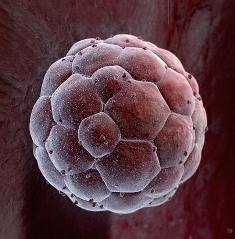February 10th, 2011 by Medgadget in Better Health Network, Research
No Comments »

 Following from the somewhat common sense idea that women who were less stressed during in vitro fertilization and embryo transfer (IVF-ET) had better outcomes, the journal Fertility and Sterility published a study out of Israel that claims “medical clowning” improved pregnancy rates compared to a group not exposed to a clown on the day of implantation.
Following from the somewhat common sense idea that women who were less stressed during in vitro fertilization and embryo transfer (IVF-ET) had better outcomes, the journal Fertility and Sterility published a study out of Israel that claims “medical clowning” improved pregnancy rates compared to a group not exposed to a clown on the day of implantation.
From the abstract:
This experimental prospective quasi-randomized study examining the impact of a medical clowning encounter after ET after IVF found that the pregnancy rate in the intervention group was 36.4%, compared with 20.2% in the control group (adjusted odds ratio, 2.67; 95% confidence interval, 1.36–5.24). Medical clowning as an adjunct to IVF-ET may have a beneficial effect on pregnancy rates and deserves further investigation.
In the methods section, the researchers describe the study design. For the intervention group (n=110) a “professional medical clown” visited the patient immediately after the procedure for about 15 minutes and performed the same routine including “jokes, tricks, and magic” while dressed as a chef.
While the study itself only uses one routine, presumably similar effects could be experienced by a patient bringing in a personal media device and watching something they know will amuse them right after their own procedure. Hopefully, no need to bring your own clown if the office won’t provide one for you. Read more »
*This blog post was originally published at Medgadget*
December 1st, 2010 by Peggy Polaneczky, M.D. in Better Health Network, Health Tips, News, Opinion, Research
No Comments »

 Oocyte preservation, or egg freezing as it’s popularly called, is now being offered by over half of U.S. fertility clinics, and half of those not offering it now plan to do so in the future. This according to a national survey conducted in mid 2009 and reported this week in Fertility and Sterility.
Oocyte preservation, or egg freezing as it’s popularly called, is now being offered by over half of U.S. fertility clinics, and half of those not offering it now plan to do so in the future. This according to a national survey conducted in mid 2009 and reported this week in Fertility and Sterility.
Over two-thirds of the 143 centers offering oocyte cryopreservation will do it electively, as opposed to those that offer it only to women undergoing cancer treatments that threaten their natural fertility.
Go West, But Be Prepared To Pay
Centers located in the Western part of the U.S. are more likely to offer elective egg freezing than those in the East. Not surprisingly, centers that only accept out of pocket (as opposed to insurance) payments were more likely to offer the procedure, reflecting the history of infertility advancement, which, unlike almost any other area of medicine, has largely been financed by private individual dollars. Read more »
*This blog post was originally published at tbtam*
October 17th, 2010 by Peggy Polaneczky, M.D. in Better Health Network, Health Policy, Humor, News, Opinion, True Stories
No Comments »

 There appears to be a new record for a cryopreserved embryo birth. From NPR:
There appears to be a new record for a cryopreserved embryo birth. From NPR:
In 1990 a couple underwent In Vitro Fertilization. They eventually had a healthy baby. They also, as is common, had a number of microscopic embryos that hadn’t been implanted, but were viable. They decided to anonymously donate them. Now, one of those embryos has produced a little boy, 20 years after being created.
In other embryo-related news, Colorado has another personhood rights bill (Amendment 62) on the ballot for November:
As used in sections 3, 6, and 25 of Article II of the state constitution, the term “person” shall apply to every human being from the beginning of the biological development of that human being.
So here’s my question: Under the proposed Colorado amendment, would this kid be legal to drink on his first birthday? I’m just sayin’…
Seriously, Colorado — just say “no” to Amendment 62. Its proponents plan to use it to try and outlaw birth control pills and IUDs.
*This blog post was originally published at tbtam*
June 1st, 2010 by Peggy Polaneczky, M.D. in Better Health Network, News, Opinion, Research
1 Comment »

In the latest media barrage on autism, fertility treatment has come into question as a possible cause for this increasingly common developmental disorder. The reason is two research abstracts recently presented at the International Meeting for Autism Research in Philadelphia.
One study assessed the history of IVF (in vitro fertilization) among 574 children evaluated at a special center for autism in Israel. The researchers found that 10% of the group diagnosed as autistic had had IVF, compared to a background rate in the overall population which they quote as 3.5%. Not surprisingly, maternal age was higher in the IVF group and the rate of prematurity was higher in the autistic children.
The second study was a look into a pre-existing database — the Nurse’s Health Study — which collects data from a cohort of nurses over time. The researchers compared the reproductive history reported by women who also reported having a child with autism and compared it to that of women who did not report having an autistic child. Of those with autistic children, 48% reported infertility with 34% having used ovulation inducing drugs, compared with 33% and 24%, respectively, in women without autistic children, a difference that was statistically significant when controlled for maternal age and self-reported pregnancy complications.
A Time article getting a lot of media play calls the results of the second study “some of the strongest evidence to date” linking autism to fertility treatment. Unfortunately, that’s just not true. Read more »
*This blog post was originally published at The Blog that Ate Manhattan*
 Following from the somewhat common sense idea that women who were less stressed during in vitro fertilization and embryo transfer (IVF-ET) had better outcomes, the journal Fertility and Sterility published a study out of Israel that claims “medical clowning” improved pregnancy rates compared to a group not exposed to a clown on the day of implantation.
Following from the somewhat common sense idea that women who were less stressed during in vitro fertilization and embryo transfer (IVF-ET) had better outcomes, the journal Fertility and Sterility published a study out of Israel that claims “medical clowning” improved pregnancy rates compared to a group not exposed to a clown on the day of implantation.













